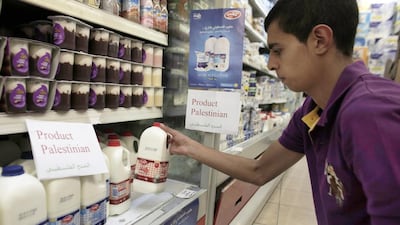Sawahreh, West Bank // A lanky young Palestinian man wearing a blue plastic hair covering is hard at work, placing containers filled with strawberry yogurt into cartons and packing them in preparation for distribution.
His work at the Hamoda Company for Food and Dairy Products may be monotonous but at least it is work, nothing to take for granted in a West Bank economy where unemployment is near twenty per cent.
But the young man’s job is now in danger, explains Hazem Mashaqi, Hamoda’s quality assurance director. So are the positions of many of the 110 other workers at the plant, located in the West Bank village of Sawahreh, after Israel last month banned imports of Hamoda’s dairy products into nearby East Jerusalem.
Hamoda sells milk, yogurt, cheese, labaneh and salads in East Jerusalem which accounts for close to fifty per cent of the company’s total sales, according to executive manager Mohammad Al Sous.
“If the ban is not ended, it will cost many jobs, maybe mine, I can’t guess,” says Mr Mashaqi , adding that the company is running promotions with cut rate prices in the West Bank in a bid to compensate for lost revenue in East Jerusalem.
Hamoda was one of six West Bank dairy and meat producers to have their products turned back at the Beitunya checkpoint near Ramallah – the transit point for goods entering Israel – on March 9 when the ban started. The other companies were dairy producers Al Rayan and Juneidi, and meat producers Siniora, Salwa and Ghoshe.
Israel says the Palestinian Authority has failed to provide adequate assurances that the products affected meet Israeli health standards.
“In light of the Palestinian Authority’s not meeting the demands of the veterinary services ... imports of animal-based products from the Palestinian Authority to Israel have been banned and this with the goal of safeguarding public health,” the agriculture ministry has said.
The ministry said it had given the PA chances in the past to raise its standards but the authority had failed to do so.
PA officials and company executives counter that these health fears are spurious. Rather, they say, Israel is trying to assert its claim that East Jerusalem – which Israel occupied and then illegally annexed in 1967 – is part of Israel, and wants Israeli firms to take over the market share of their ousted Palestinian counterparts.
“They want to claim East Jerusalem as part of Israel’s capital,” says Tariq Abu Laban, director-general for marketing in the PA ministry of agriculture.
“The facts are that those products before being allowed to enter East Jerusalem are inspected by the Israeli side, a sample of each shipment is taken by Israeli officials to the Israeli laboratory and is tested to be at the standards,” he says. “They meet the standards and that’s why they’ve been allowed to enter” in the past.
On March 23, the PA hit back by banning five Israeli beverage and meat companies from being sold in the areas it controls. They are dairy producers Tnuva, Tera and Strauss, Soglowek meat products and Tapuzina soft drinks.
The UN’s Food and Agriculture Organization (FAO), which is gathering facts on the dispute, says that Hamoda and other companies that were banned should be credited for working to raise their standards.
"Quite a significant amount of work has been done by Hamoda and other companies to close any gaps," Mischa Tripoli, a FAO economist who visited the Hamoda offices on Sunday, told The National.
To some Israelis, the ban is misguided. Israel's Coordinator of Government Activities in the Territories, Gen Yoav Mordechai, has voiced concern that dismissals of workers could inflame the situation further in the West Bank. He has been pressing the country's agriculture ministry to lift the ban, thus far without success, according to Haaretz newspaper.
A wave of violence that began last October has killed more than 200 Palestinians and 28 Israelis. Israel says that most of the Palestinians killed had carried out, or were attempting to carry out, attacks against Israelis, but Israeli forces have been accused of using excessive force in many cases.
Hamoda started as a very small operation in 1987. Its gross sales in 2015 were 42 million shekels (Dh40.44m), according to Mr Al Sous.
It has shipped its products to East Jerusalem for more than 25 years with the exception of one month in 2010 when Israel’s agriculture ministry stopped them, citing the same reason as now. Palestinian officials said the shipments continued only after intervention by the international community – including the Middle East peacemaking quartet made up of the United States, Russia, the European Union and the United Nations.
Until the latest ban, Hamoda was a success story amid the bleak overall Palestinian economic picture. Since 2011, it has had an average growth rate in sales of 14.5 per cent a year, Mr Al Sous says. It increased its staff by 25 per cent in those five years, and added six new products including desserts and spreadable and processed cheese.
Since the ban, the company has reduced its milk production by one third, he says and is bracing for reduction of other products and 42 staff layoffs next month unless the ban is rescinded.
“If they ban our products in East Jerusalem, it means East Jerusalem will be flooded by Israeli products,” Mr Al Sous says. “That’s the hard situation we cannot accept. You are a free person and you shouldn’t be forced in selections of your food.”
“If they have any problem with the Palestinian veterinary service, then let the international community assist the veterinary service by building up their capacity so that they can complete their role. It’s not acceptable at all to stop things within one day, to cut the revenues of a company by fifty per cent overnight.’’
foreign.desk@thenational.ae

